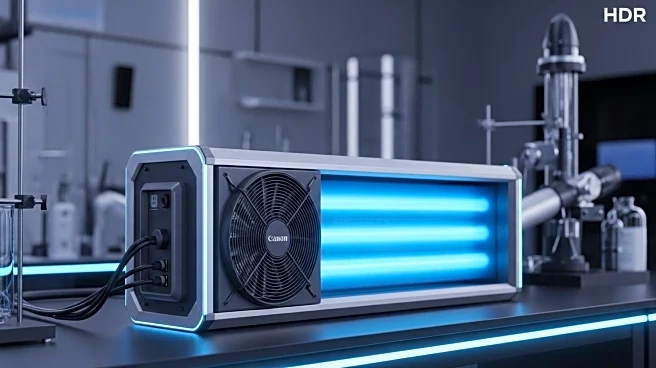What's Happening?
Researchers at the Johns Hopkins Applied Physics Laboratory (APL) in Laurel, Maryland, have developed a new solid-state thermoelectric refrigeration technology using nano-engineered materials. This innovation is twice as efficient as current devices made with commercially available bulk thermoelectric materials. The technology, known as controlled hierarchically engineered superlattice structures (CHESS), was initially developed for national security applications and has now been demonstrated to improve heat-pumping efficiency and capacity in refrigeration systems. The CHESS technology marks a significant leap in cooling technology, offering a scalable alternative to traditional compressor-based refrigeration systems.
Why It's Important?
The development of CHESS technology is significant as it addresses the growing demand for energy-efficient, reliable, and compact cooling solutions. Conventional cooling systems are often bulky, energy-intensive, and reliant on chemical refrigerants that can harm the environment. The new thermoelectric refrigeration method eliminates the need for moving parts or harmful chemicals, making it a sustainable option. This advancement could lead to widespread adoption in various applications, from small-scale refrigeration systems to large building HVAC applications, similar to the scaling of lithium-ion batteries. The technology also promises cost efficiency and environmental benefits, potentially transforming the cooling industry.
What's Next?
APL plans to continue refining the CHESS thermoelectric materials to boost efficiency further, aiming to approach the performance of conventional mechanical systems. Future efforts include demonstrating larger-scale refrigeration systems, such as freezers, and integrating artificial intelligence-driven methods to optimize energy efficiency in compartmentalized or distributed cooling systems. The success of this technology opens doors to scalable energy-harvesting applications, including computers and spacecraft, beyond refrigeration. APL is looking forward to continued research and technology transfer opportunities with companies to translate these innovations into practical applications.
Beyond the Headlines
The CHESS technology not only improves refrigeration efficiency but also has potential applications in converting temperature differences into usable power, such as body heat. This capability could advance next-generation tactile systems, prosthetics, and human-machine interfaces, offering new possibilities for energy harvesting technologies. The scalability and cost-effectiveness of the production process make it ideal for widespread adoption, potentially leading to significant shifts in energy consumption and environmental impact.









